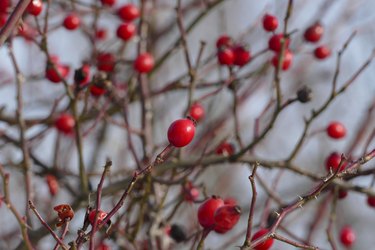
Being a responsible pet owner includes knowing risks and dangers for your pets. This is easier said than done, of course, in a world full of tempting things to eat and dangerous scenarios around every corner. One thing about which you can relax to an extent is rose hips, which are not toxic to animals.
Tip
Just because rose hips aren’t technically toxic doesn’t mean they’re necessarily safe. The bush could have been sprayed with pesticides, or your pet may be allergic to the plant — you just never know.
Video of the Day
What Are Rose Hips?
Rose hips are a good reason for leaving your roses (Rosa spp.) on the plant after their bloom begins to fade. These fruits are just under the petals, and once the petals fall, you'll see these berrylike fruits that are typically orange or red but can range from purple to black too. Birds love rose hips, and so do other animals, like cats and dogs.
Video of the Day
They're packed with nutrients and vitamins, like beta carotene and lycopene, as well as inflammation-fighting antioxidants, like vitamin C and quercetin. They're also high in fiber since they contain lots of seeds.
In humans and pets, it's thought that rose hips can help with arthritis pain and heart health, but like anything in life, all rose hips are not equal.
Rose Hips and Pet Care
The seeds in rose hips are often ground to create an oil used to alleviate itchy skin for pets. In North America, rose hips are less commonly used as a healthy ingredient, but elsewhere in the world, you'll find pet foods and pet care regimens that include vitamin-C-packed rose hips. (Of course, vitamin C is nonessential for dogs.)
There's a difference between commercially harvested or processed rose hips and those growing on the shrub down the block. Rose plants are fine for animals to ingest. The leaves, stems, flowers and seed pods or hips are all safe for animals. In fact, the most dangerous part of the plant tends to be the thorns.
Rose hips are used for essential oils and pet shampoos and conditioners, and they're also turned into a powder for use in teas, pet foods and snacks. Rose hips are recommended for pets like chinchillas and guinea pigs that struggle to create vitamin C and love chowing down on dried rose hips, which are low in sugar and easy for them to digest. In fact, a tablespoon or two of rose hip powder will give a horse all the vitamin C it needs for a day.
Moderation Is Key
Pets may enjoy noshing on rose hips, but it's unlikely they'll eat too many, as the fruit can get pretty hairy inside their thick skins. If your pet has decided it loves rose hips and has gone to town eating them, it's possible that it can have a bad reaction. Your pet could get lethargic, start vomiting, have discomfort, get diarrhea and so on, but this is true of most natural foods.
If you've ever had an incident after eating too many bananas or cherries, then you can relate — sometimes, too much is just too much. It's the same thing with rose hips and your pet. Don't mistake the rose of Sharon (Hibiscus syriacus, USDA zones 5-9) as a safe rose to consume, as they're from the hibiscus family and are somewhat toxic for pets.
Roses tend to be one of those flowers about which some gardeners go wild. They can go to extremes with sprays and pesticides if it means getting the best blooms. If so, those toxins will be present on the rose hips too, and that can be dangerous for Fluffy or Fido. So, be wary of excessive consumption of rose hips when you don't know the gardener's routine.